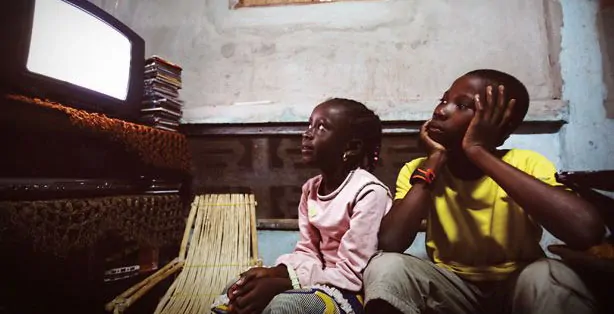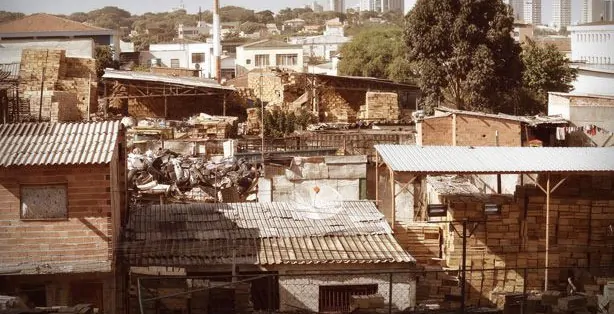
Kani Ibrahim Mohamed sits perched on a chair with her black and gold gown covering her right past her toes. She keeps adjusting the headscarf over her henna hair while her 3-year-old, Guled, does his best to sit as close as possible to their old television. There are no pictures on the wall and only one large rug covers the floor. The place is so minimal it looks spartan; but for Kani, this is everything—her jewel, her pride, her America. It’s leagues away from her old life in Somalia and Ethiopia and it’s where she can live, as she says over and over, “a freedom life.”
In 1987, she and her family returned to Somalia from Yemen after her father abandoned them. Then, in 1988, they were caught up in one of the longest-running civil wars. The family made it over to Ethiopia where they stayed in the Daroor Refugee Camp. When her mother died in 1993, Kani and her two brothers were taken to live with their uncle in Hargisa, Ethiopia. One would be hard pressed to call this period of time “life” and the quietness in Kani’s voice can only hint at all she went through. In 1997, Kani was forced to endure a second round of female circumcision—a surgery that would allow her uncle to require more cattle and camels from prospective suitors. The operation was done without any anesthetic or clean instruments and left her infected and in extreme pain. She shakes her head and says more was done to her, but she will not speak of those events—they were, she says, “unmentionable things.”
Kani arrived in Nashville, Tenn., with Guled in mid-November last year and now lives in a Section Eight apartment complex with other Somali families. She’s eager to tell her story and keeps trying, even when the English becomes difficult. She shows her personal narrative, neatly typed out by a translator—part of her petition to be granted refuge in America.
She hopes Guled will get a good education and that his father, her husband, will be able to join her here. She talks about her life here and says that most days she remains in her apartment or visits with her neighbors. On her given day, she goes out shopping with a World Relief team member. She fears that once the World Relief program’s three-month financial support period ends in mid-February, she will have to meet the rent and bill demands without having a job and without knowing much English.
Julia Kevon, her World Relief caseworker, says Kani hasn’t started ESL (English as a Second Language) classes because Kani refuses childcare. In Somali culture it’s considered taboo to leave your child with strangers. It is just one sign of the tension between Kani’s native culture and this new American one.
{sidebar id=10}
Perhaps this is what unnerves many Americans about “the foreigner.” The concern that even though an immigrant lives in America now, he or she may never fully adopt and embrace the American way of life. Stanley Renshon, a Fellow and expert at the Center of Immigration Studies, summarizes this continued complex situation, arguing that “whilst the immigrant now faces the challenge of assimilating into this new society, America’s own domestic conflict with multiculturalism, cosmopolitanism and a shared nationalism makes forging an identity rather overwhelming.”
It becomes increasingly difficult to even qualify what being an American looks like when one considers that America is a country with a history of fluidity, change, immigration and movement; with numerous people groups moving in and out. Fears over immigration have plagued America since its birth, and have come and gone in cycles as people adjust to new faces, new words and new dishes—yet always fearful of losing the familiar and comfortable. The Tennessean, a Nashville-based newspaper, recently published a reader’s complaint that Tyson’s chicken factory was shipping Somalians over to Shelbyville to fill in positions instead of giving the jobs to Americans. Not only does this show a frightening lack of education but also the deep-seated and common resentment of lost jobs.
Kevon expresses surprise at how many of these common fears and misconceptions of immigrants come from those within the Church.
“In relation to refugees fleeing from war, God has set a mandate for us to take in and provide for them, but it’s not happening,” Kevon says. “Instead the government, whether state or federal, is bearing the brunt. We take them in and immediately spit them out; we don’t give them refuge.”
In Nashville alone, both World Relief and Catholic Charities deal with around 1,000 cases a year, with various other groups meeting the rest of the demand. Because of the demand, World Relief has a six-month cut off point for assisting refugees. A policy that may seem harsh, until one considers that a single case may well mean a family of 10 and everything from getting social security numbers, to doctor checkups, to simply showing them the ropes is handled by one World Relief staffer. The need for more help is definitely great.
Colette Bercu from Free For Life Ministries, takes the matter further, campaigning to expose human trafficking in and around Nashville, Tenn., and nationally. “If you’re not watching your children, someone else is,” she says. Bercu points out the very clear connection between the human trafficking trade and illegal immigrants. The lack and care of an established community, limited work opportunities and language barriers make illegal immigrants very easy targets. In Tennessee last November, two men, Jesus Garcia and Arturo Perez, went to trial for enslaving a 22-year-old woman and driving her across different states to sell her for sex. They would often hire her out to seven different men a day. Both men received only a six-month jail sentence and will then be deported. Although things have improved since and Tennessee has become the first state to pass a new Sex Slave Law—which carries an eight- to 12-year sentence—there are still scores of immigrants and refugees on the fringes of society who are prey to the underground world.
Despite all the politics and the delicate intricacies of social dynamics and demographics, illegal and legal immigrants and refugees are foreigners who most of the time we live alongside, but usually not with. Just a brief look at some of the commands of the Old Testament spells out God’s desire in this: “‘When foreigners reside among you in your land, do not mistreat them. The foreigners residing among you must be treated as your native-born. Love them as yourself, for you were foreigners in Egypt. I am the Lord your God’” (Leviticus 19:33-34, TNIV). Jesus Himself lived out those commands in His open communication with the Roman Centurion, the Syro-Phoenician woman and His renowned message of the Good Samaritan.
“I would like American friend, but I don’t know any,” Kani says. She smiles as she says this. She would like to see more than her small apartment block. She has not been here long enough to know the thoughts people have when they see a veiled woman or to understand the comments about her level of English. All she has is her gratitude that she now feels safe with hopes of a “freedom life in America.”























